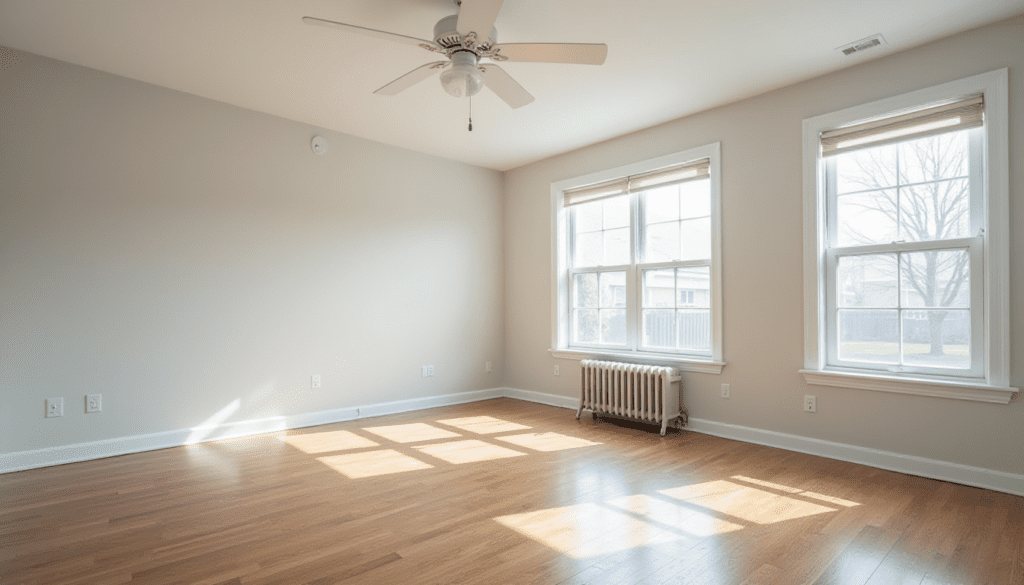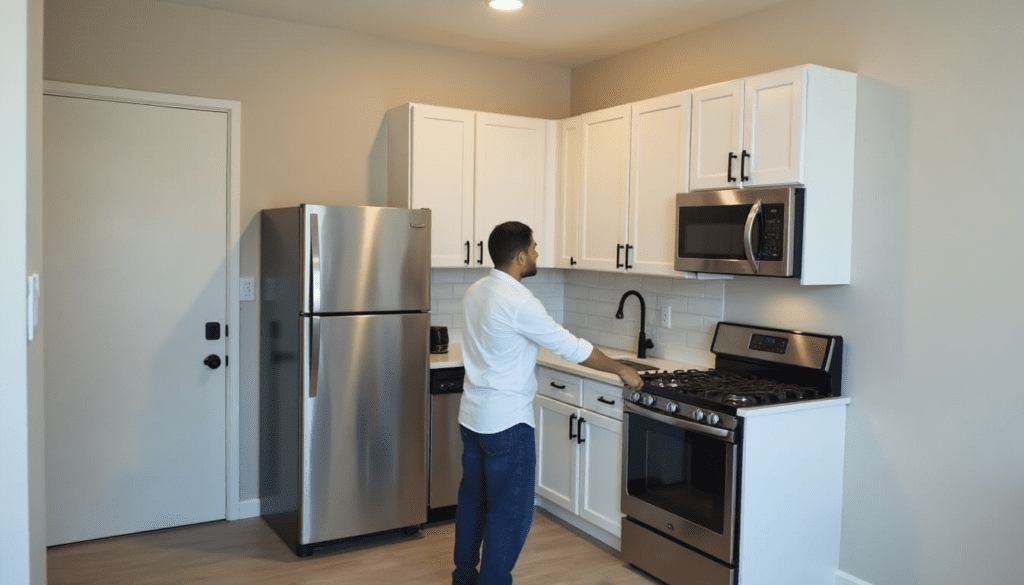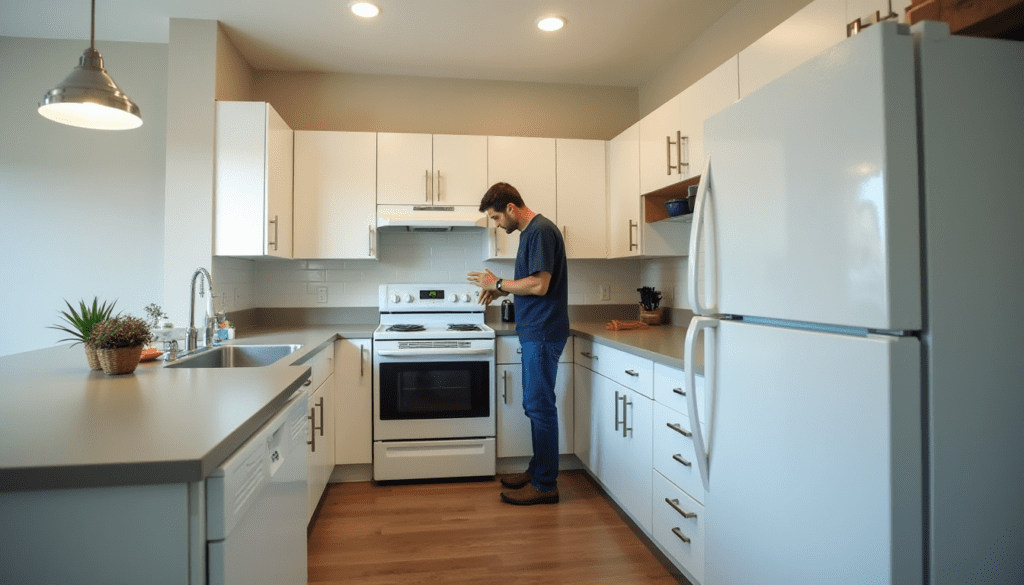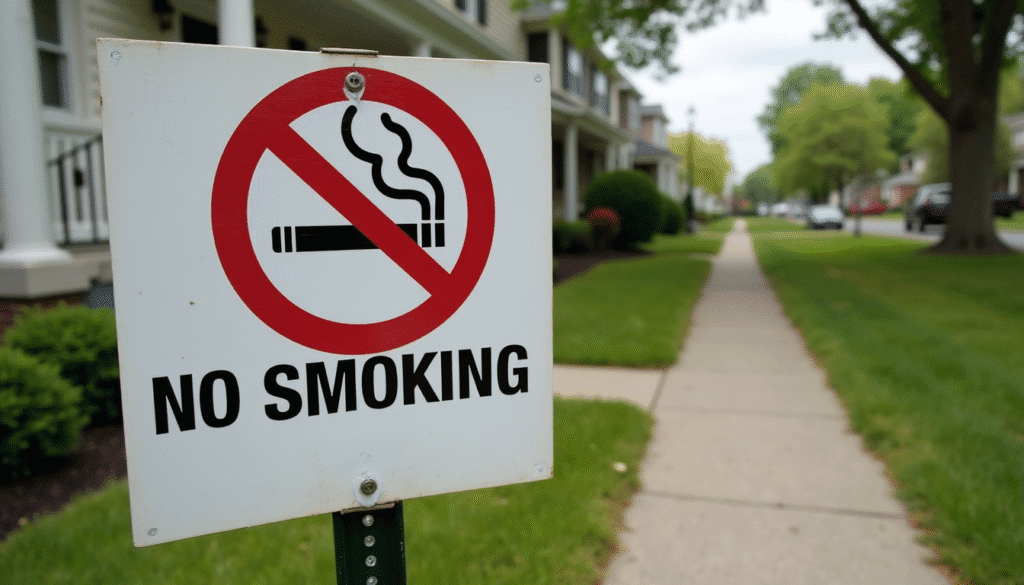As a landlord in Plainfield, New Jersey, it’s your right to protect your rental property from the damage and liability caused by smoking. Whether it’s traditional tobacco, vaping devices, or cannabis, smoking inside a rental unit can leave behind costly residue, odors, and health risks to other tenants. Fortunately, New Jersey law provides ways for landlords to prohibit smoking — if done properly.
This guide walks you through how to legally and effectively implement a no-smoking policy in your Plainfield rental, how to update your lease agreement, and how to handle enforcement without violating tenant rights. We’ll also explain how NJ’s cannabis laws play into this and what every Plainfield property owner should know.
Why Landlords Ban Smoking
Smoking is not just a nuisance — it’s a major risk to property and tenant health. Here are the top reasons Plainfield landlords choose to implement a no-smoking policy:
- Fire Hazard: Smoking is one of the leading causes of residential fires in the U.S., according to the National Fire Protection Association.
- Property Damage: Cigarette smoke stains walls, ceilings, and carpets — resulting in higher turnover cleaning costs.
- Secondhand Smoke Liability: Non-smoking tenants may file complaints or even lawsuits over health issues linked to exposure.
- Odor Issues: Smoke odors are notoriously hard to remove and may impact future tenant appeal or rental value.
These costs, combined with increasing tenant demand for smoke-free living, make a no-smoking policy a smart business decision.
New Jersey Smoke-Free Laws & Plainfield Regulations
The New Jersey Smoke-Free Air Act gives local governments and landlords the authority to restrict or prohibit smoking in multi-unit buildings. While smoking in common areas is already banned in most multifamily housing, landlords can take it a step further and ban it entirely — including in private units.
In Plainfield, local ordinances reinforce state laws. According to Queen City NJ, smoking marijuana is only legal in private residences — unless restricted by lease terms. If you’re a landlord, you have every right to prohibit cannabis and tobacco use inside your property with a clearly written lease clause.
Your Rights as a Plainfield Landlord
New Jersey landlords have broad authority to set the rules for what is and isn’t allowed in their properties — including banning all types of smoking. You do not need to allow smoking, even though substances like tobacco and cannabis are legal.
However, you must include these rules in your lease agreement. If you try to enforce a no-smoking policy without a written clause, tenants may claim they were not properly informed and fight enforcement in court.
This means your best protection is a proactive one: create a legally enforceable lease clause that clearly defines what counts as “smoking” and how violations will be handled.
Drafting a Legally-Enforceable Lease Clause
To avoid confusion and ensure your policy holds up legally, you need to be precise in your lease language. Don’t just say “No smoking allowed.” Spell it out in detail, covering all possible interpretations. Here’s what to include:
Defining “Smoking” (Tobacco, Vaping, Cannabis)
Make sure the clause states that smoking includes the use of:
- Traditional tobacco products (cigarettes, cigars, pipes)
- Electronic cigarettes and vaping devices
- Recreational or medicinal marijuana, including edibles that emit smoke or vapor
For example, you could write:
“Smoking, including but not limited to the use of tobacco, marijuana, or electronic vaping devices, is strictly prohibited inside the unit, hallways, balconies, and all other areas of the rental premises.”
Including Designated Outdoor Areas (If Any)
If you’re open to allowing smoking in specific outdoor locations (like a backyard), be clear about that in your lease. Consider including:
- Exact locations where smoking is permitted
- Hours when smoking is allowed
- Required disposal (e.g., use of ashtrays, no littering)
This provides a balanced option for tenants while still protecting your interior spaces from damage and complaints.
Legal Considerations: NJ Cannabis Laws
Since recreational marijuana was legalized in New Jersey, landlords have had to deal with new legal gray areas. The law allows adults to possess and consume cannabis privately, but it also allows landlords to set limitations through their lease agreements.
According to UBFK Law, landlords may prohibit marijuana use — both recreational and medicinal — as long as it’s written clearly into the lease.
Recent Recreational Cannabis Law
New Jersey legalized cannabis use in 2021, but that doesn’t mean renters have the automatic right to smoke inside your unit. Your rental property is still private property, and if your lease bans cannabis smoke or vapor, you can enforce that ban.
Federal vs. State Conflicts
Keep in mind: cannabis is still illegal at the federal level. This could impact properties that receive federal funding (e.g., Section 8). If you rent to tenants under these programs, a smoking ban is often mandatory — and enforced even more strictly.
Enforcing the Policy: Steps & Legal Process
Once your lease includes a clear no-smoking clause, the next major step is enforcement. This part is essential—not just to protect your property’s condition, but also to maintain a consistent, legally defensible approach. Tenants and courts will look at how you implemented and followed through on the rule, so documentation and communication are key.
Warnings and Lease Addenda
If you spot signs of smoking—ashtrays, lingering odors, vape residue—you can issue a formal written warning. This document should:
- Include the specific lease clause violated.
- Note the date, time, and nature of the violation.
- Require remediation (e.g., cessation of smoking, cleaning) within 7–10 days.
- Warn that failure to comply may lead to monetary fines, lease termination, or eviction.
If your current lease didn’t contain the no-smoking clause, you can present a lease addendum for signature. Make it part of the lease renewal package—ideally with a positive incentive, such as discounted rent, complimentary cleaning, or upgraded fixtures upon signing. Many NJ landlords find that taking this cooperative yet firm approach reduces resistance and fosters goodwill while protecting properties at turnover .
Curing Violations vs. Eviction Process
If a tenant continues smoking after the warning, you can send a Notice to Cease, giving them a set time to comply. If they still don’t follow the lease terms, a Notice to Quit is your next step.
Under New Jersey law, repeated lease violations—especially those that damage property or disturb other tenants—may warrant eviction. That said, eviction is a serious and time-consuming legal process. You’ll need clear, dated documentation: copies of notices, photos of damage or residue, and records of tenant communications. Courts will almost always examine whether enforcement has been consistent and fair.
Before jumping to eviction, consider mediation or negotiation. Sometimes tenants simply weren’t fully aware of the damage their habits caused. You may recover cleanup costs and maintain goodwill with minimal expense.
Handling Disabled Tenants & ADA Accommodations
New Jersey landlords must be sensitive to possible ADA or Fair Housing requests, especially involving medical cannabis. A tenant may claim that vaping or cannabis smoking is a medical necessity. While landlords aren’t obligated to permit smoking that affects other tenants, they may be required to make “reasonable accommodations.”
That said, “reasonable” doesn’t mean compromising your smoke-free policy. Typically, accommodations come in other forms, such as allowing non-smoking alternatives (edibles, tinctures). You can reasonably restrict any form of ingestion that generates odor or smoke beyond the tenant’s unit. If someone requests an exception, you should:
- Ask for documentation of medical need (e.g., doctor’s note).
- Suggest reasonable alternatives that comply with your no-smoking rule.
- Be prepared to engage in an interactive process to seek solutions.
By handling medical requests thoughtfully—while upholding your policy—you reduce discrimination risk while keeping your property safe and compliant. Nolo’s guide on tenants’ smoking rights is a helpful legal reference .
Penalties and Smoke Remediation Costs
Despite your best efforts, incidents may still occur. When smoking damage is found, enforce consequences outlined in your lease. These typically include:
- Security Deposit Deductions: Clearly state in the lease that smoking breaches constitute damage—permitting deductions for repainting, carpet cleaning, air duct sanitization, and odor elimination.
- Direct Charges: For serious infractions, you may charge beyond the deposit to cover professional smoke remediation services.
- Third-Party Inspection: In high-end or disputed cases, hire a licensed inspector. They can produce official reports and estimates—critical if a tenant contests charges in court.
Always present an itemized receipt when charging a tenant. Transparent documentation—photos, dates, receipts—will increase your chances of winning deposit disputes and keeping your reputation intact.
Best Practices: Signs, Tenant Communication & Consistency
Your policy is only as strong as its communication and consistent enforcement. Follow these steps to ensure it’s effective:
- Clear Signage Everywhere: Display professionally printed or weather-resistant “No Smoking” signs in shared spaces—entrances, lobbies, elevators, stairways—so there’s no confusion.
- Prospective Tenant Education: During property tours or lease demos, verbally highlight that the unit is smoke-free—with all forms (tobacco, vaping, cannabis) included.
- Regular Inspections: Schedule walk-throughs (with proper notice) to check for compliance. Early detection allows you to issue warnings—rather than escalate late-stage enforcement.
- Consistent Enforcement: Apply penalties equally to all tenants to prevent discrimination or selective enforcement claims.
Plainfield-Specific Policies & Ordinances
While state laws like the New Jersey Smoke-Free Air Act give landlords broad authority to restrict smoking, it’s important to consider Plainfield’s specific regulations and local enforcement culture. Plainfield follows state regulations closely, with additional municipal attention given to secondhand smoke in multi-unit buildings and cannabis control.
According to Queen City NJ, Plainfield adheres to state law that bans cannabis consumption in public and communal areas — including apartment hallways, lobbies, and common outdoor spaces. This complements your lease policy and empowers you to enforce it more effectively.
Further, Plainfield’s health department has supported clean air campaigns and signage standards. If you’re operating a multifamily unit, consider aligning your property signage with local campaigns to show you’re in compliance and proactive about tenant safety.
We also recommend monitoring updates from NJ GASP (Group Against Smoking Pollution) to stay ahead of any local changes in enforcement or health ordinances that could affect your lease language or tenant communications.
FAQs: People Also Ask
Can a landlord ban smoking in Plainfield, NJ rental property?
Yes. In New Jersey, landlords have the legal right to ban smoking—including tobacco, cannabis, and vaping—on their rental property, as long as it’s clearly written into the lease agreement.
What NJ laws apply to smoking inside rental units?
The New Jersey Smoke-Free Air Act prohibits smoking in common areas of multifamily dwellings and allows landlords to extend this restriction to individual units by including it in the lease. Local ordinances, like those in Plainfield, may reinforce these policies.
Does recreational cannabis legalization affect my lease smoking ban?
Not directly. Even though cannabis is legal in New Jersey, landlords are not required to allow smoking or vaping cannabis inside rentals. You can restrict all forms of smoking through a lease clause, provided it applies consistently.
How do I enforce a no-smoking clause in NJ?
Start by issuing a formal written warning, then a Notice to Cease. If the violation continues, follow up with a Notice to Quit and consider eviction proceedings. Always document the process thoroughly.
Can tenants request accommodations for smoking due to disability?
Yes, but accommodations must be reasonable. You’re not required to allow smoke or vapor that affects others. Tenants can request non-disruptive alternatives like edibles or oils if cannabis is medically prescribed.
Summary & Recommendations
Banning smoking in your Plainfield rental is one of the best moves you can make to protect your property and meet growing tenant demand for smoke-free living. From the legal backing provided by New Jersey law to practical enforcement strategies and clear communication, landlords have many tools to make this transition smoothly.
Here’s what to remember:
- Be specific in your lease clause. Define “smoking” clearly.
- Follow the proper enforcement steps—warn, document, and escalate only if needed.
- Post signage, discuss policies during showings, and apply rules consistently.
- Stay informed of Plainfield ordinances and public health updates.
Protecting your investment starts with a well-drafted lease and a clear, enforceable policy. Don’t leave it up to chance—or an ashtray on the windowsill.
Call to Action: Get Help from RentShield Property Management
Need help drafting a bulletproof no-smoking lease clause? Want a lease addendum template or professionally printed signage that complies with Plainfield and NJ law?






